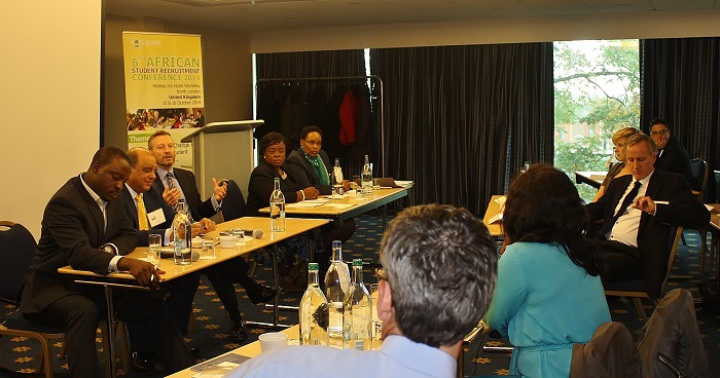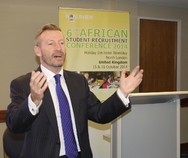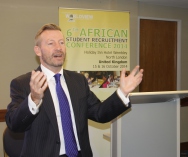Africa Student Recruitment Conference UK 2014
During 15 & 16 October, the Wembley Holiday Inn played host to the 6th Annual Africa Student Recruitment Conference, but this year was different. Following an agreement to work together, the original organisers, Worldview Events, had agreed to join with MGH Educonsult in order to provide arguably the best ever forum for the discussion of student recruitment issues from the continent, with specific emphasis on Sub-Saharan Africa.
MGH brought experience, contacts and associates to bear on what would prove to be an excellent event, attracting delegates from around the globe including the USA, Sweden, New Zealand, Ireland, France, Canada, Egypt and of course the UK.
The focus of the event was a 360 degree examination of traditional student recruitment; given the recent health scares and of course terrorist activities in the region, the traditional models may have to be reassessed.
Sessions followed a route through the 2 days highlighting the potential of partnerships with Africa
and how Africa is open to working with educational partners from around the world.
DAY 1
Beginning with an introduction from Folabi Obembe (Worldview Director) and Matthew Hornshaw (MGH
Educonsult Managing Director) Matthew then led a session to look at an overview of Student Recruitment in Africa; highlighting trends, opportunities and threats. It is apparent that the majority of
SSA students that study a qualification from outside of their own country will turn to South Africa as it continues to place itself as an education hub. The Francophone countries presently look
toward France - could this be an area of growth for others? - and the powerhouse of Nigeria is becoming much more varied. With the UK & USA historically being the dominant study destinations for
Nigerians, students now have more information available to them and can choose from a vast range of alternative destinations such as Russia & Eastern Europe, Australia, India, China and the
rising stars of Canada and Malaysia. Ghana is heading more toward the USA where scholarships and historical links are favoured and even Kenya, seen as predominantly UK, favours study with
institutions from the US. So where does that leave the UK? UK institutions must be more strategic, of course recent immigration policy changes may have had an impact on recruitment from within the
SSA region, but the UK must start to work long term and work with Africa and African partners. With external factors strongly influencing student recruitment, partnerships should become
important, whether with agents, academic institutions or governmental bodies; professional, strong, two way partnerships, with agreed aims and objectives and regularly monitored, must be a way
forward.
This led nicely into an informative session from Mr Reuven Fletcher of Travel Safe Training Consultancy, ensuring that those wanting to travel to Africa were fully prepared and briefed ensuring that risk assessments and preparations were fully tasked. Professor Julius Okojie, Executive Secretary of the Nigerian National Universities Commission spoke passionately about his role and that of the NUC and how Nigeria now had an HE sector that was building toward full international engagement.
Cecilia Pereira-Yates, of GB8 Consultants, gave a wonderful session focussing on the importance of culture in international recruitment; understanding the needs of African students and institutions and how the student experience fed back by word of mouth to impact on reputation and thus student recruitment. Lebari Ukpong, a leading light in in-country university office management in Nigeria discussed the challenges and opportunities of having a university in-country presence and how, by having a presence in a market such as Nigeria, this really does impact positively on student recruitment. Matthew spoke again toward the end of the day highlighting the importance of the institution/agent/student relationship, or as he considers, the business partnership. He noted the lack of due diligence in many agent appointment processes and the informality of relationship management with little regular monitoring or follow up of the relationship; the importance of the partnership evading many institutional managers. Before a networking dinner could take place, delegates were given the opportunity to meet a great number of agents and discuss if there were mutually beneficial areas they could work with.
DAY 2
The second day took a giant stride into the institutional relationship model and examined how providers can enter into more closely aligned partnerships, leading either directly or indirectly to improved student recruitment. Global Head of Business Development at Hult International Business School, Mr German Fernandez, started the day by exploring the "internationalisation" agenda and how Africa fits. International educationalist, Mr Guy Doughty, of Doughty Consultants, provided delegates with a case study of local delivery in Nigeria and how local economies drive demand for programmes of study; not vice-versa. Dr Arthur Appianda Director at the Regent University College of Science & Technology in Ghana provided an in-depth view on the importance of institutional partnerships highlighting the need for overseas partners to work with Africa not look down upon them.
Rhodri Llewellyn, Director of Axial College in Kampala, Uganda, a private provider set up to be a long term overseas qualification provider, explained the intricate and time-consuming process the college went through to ensure that quality standards were met as they began providing UK programmes locally. Ms Margaret Lesuuda, of the Kenya High Commission in the UK, stressed the importance of Kenya as a local base for overseas providers and that, with a change in local policy, Kenya now aims toward being an education hub in Eastern and Central Africa. The day was capped off by Dr Raj Gill, a veteran of Africa and COO of Edulink Consultants. Dr Gill was the lead on setting up the Dubai and Mauritius campuses for Middlesex University and he gave a thorough run down of how serious an overseas provider must be if they wish to be a full service campus in Africa; forget the academic programme, try and remember the local logistical issues that are involved first!
Overall the conference was extremely well received and will be the starting point for a set of MGH Educonsult workshops that will follow on from various subjects touched upon. The first two sessions planned will be to look more closely at the agent/institutional relationship and for a session specifically aimed toward Kenya as a destination for in country partnerships, with input from the Kenya government. For any initial interest please contact us.
The PIE news also followed up on the conference and their report can be viewed here.
The Student Travel Magazine report on the ASRC 14 makes for interesting reading.
Regent University of Science & Technology (Ghana) also reported back from participation
at the conference with Dr Arthur Appianda's summary.




